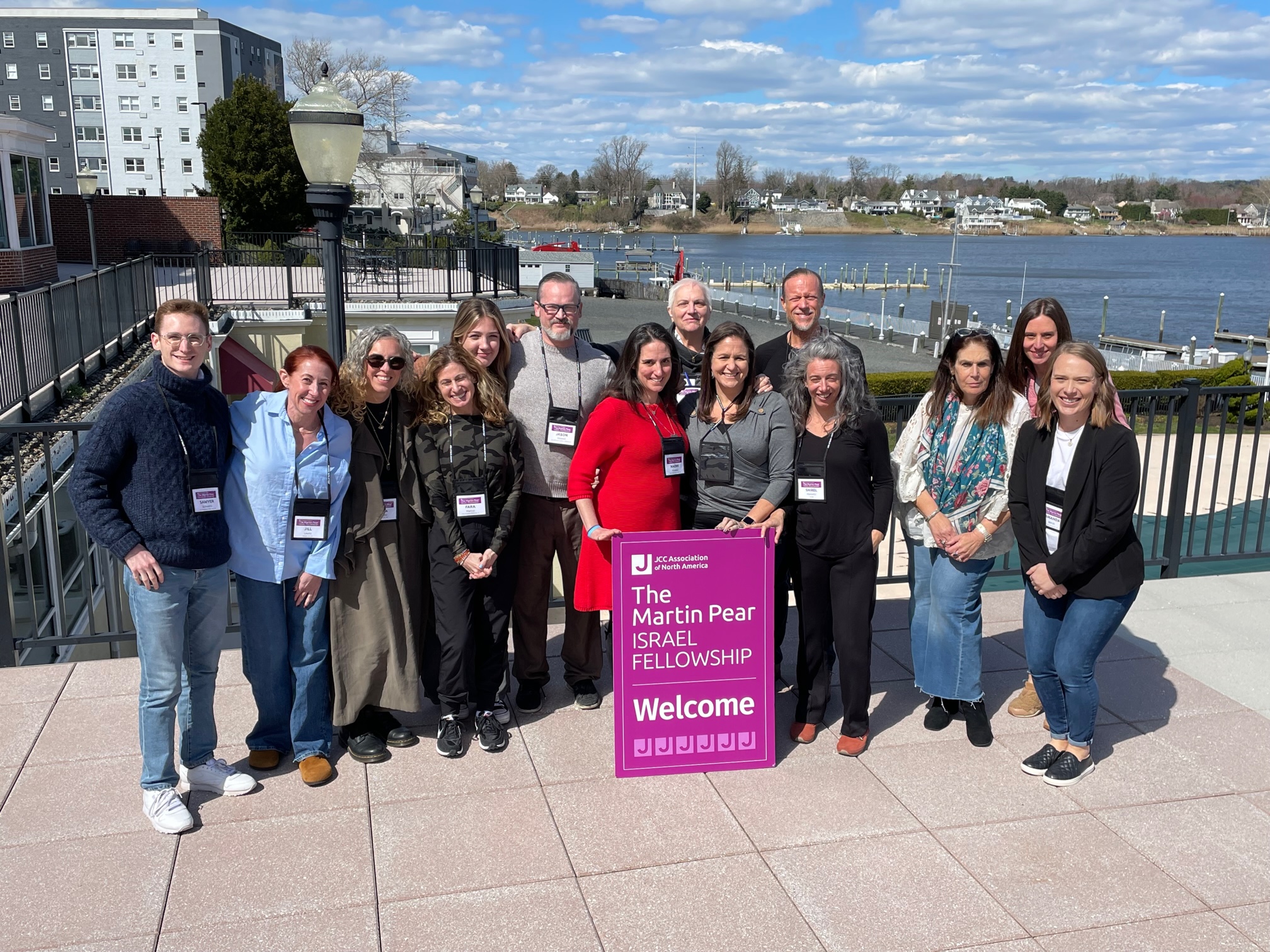By Ellen Daniel
Gam v’gam—a concept we learned at the military cemetery atop Mount Herzl in Jerusalem—rings through my thoughts weeks after we have all landed again in North America: that two seemingly contradictory things can both be true. That day, our group, 10 Jewish professionals from JCCs across the United States and Canada, traveling as part of the Martin Pear Israel Fellowship of JCC Association of North America, was standing among the freshly dug graves of Israeli soldiers killed in battle just days before. Teenagers wandered through the growing number of plots, honoring the memory of their friends who are gone much too soon. That is the price of their freedom.
The security guard who traveled with our group was 23 years old and had recently returned from reserve duty in Gaza. Throughout the trip, he joked with us and patiently teased stragglers. And he humored all the “Jewish moms” who wanted to give him input into his upcoming summer trip to the United States. In our eyes, he is still a child—not much older than some of our own children. At the same time, we know he has seen things none of us can ever imagine. Gam v’gam.
We were in Jerusalem on Shabbat. Earlier in the day, we heard the horrifying news that three hostages the IDF attempted to rescue had been found, but they were not alive. The country’s hopes were dashed. Three more hostages who will never come home. Yet hours later, we were dancing and singing among crowds of Israelis at the Kotel (the Western Wall), welcoming Shabbat with joy and promise. Gam v’gam.
Signs of the ongoing war are present throughout Israel. Hostage posters and memorials mark the streets and institutions. It dominates news headlines and discussions among family and neighbors. We were all prepared for that. We had seen the images of Hostage Square and read the headlines at home. What resonated more deeply—something we could only feel on the ground—is the impact on each individual and the hunger to make sure Israel survives.
At Yad Vashem our guide shared something else we already knew: Six million Jews perished in the Holocaust. He said, however, that it wasn’t simply six million. That is a number we can’t comprehend. It’s 1 + 1 + 1… Each of the six million was a person with a family and a story. Each of the young lives marked by the Children’s Memorial was someone’s child, a life cut much too short. We started to understand what he meant at the site of the Nova Music Festival. When we were walking around the festival grounds, we didn’t see 300 people killed. We saw 1 + 1 + 1. We saw each of their pictures, decorated with their favorite sports teams, musicians, colors, and trinkets. Each one was a young person, vibrant and full of life, with promise. They all had plans for their future.
In the nearby town of Sderot, we spoke with an inspirational social worker who is supporting that community, her community, along the Gaza border. As we sat there, we began to hear gunfire and artillery fire in the background—enough to rattle the windows. While I’m sure the social worker noticed, she didn’t seem concerned. That’s daily life in her town. The next day we learned there had been a significant battle in Jibalya, about two miles away, where Hamas had regained some control. We all left asking the same question: “How could you stay?” This, of course, is not the first time their community has been on the front lines of war. Our tour guide, Abraham, told us, “If we left, eventually the border of Israel would be Tel Aviv.” They stay because someone has to. That is the price of their freedom.
This survival instinct is baked into Israeli existence. Throughout time, many groups of people have tried to rid the world of Jews. At Hezekial’s Wall, we saw one of the most important modes of survival in Western history—innovation and foresight that prevented the Assyrians from entering Jerusalem around 700 B.C., which would have wiped out all Jews and thus the concept of monotheism.
In modern-day Israel, survival looks like standing up to Hamas and Hezbollah, but it also looks like creating innovative environmental and technological solutions to thrive. Facing dire water shortages, Israel created water desalinization plants that have all but eliminated the crisis. Survival looks like jumping in to help. As war broke out, many farmers and food manufacturers were called into the reserves. Farms went unharvested. Fruit wasted in the fields. Leket Israel jumped in to help solve the problem by organizing volunteers to pick and process the food, donating it to people and organizations in need.
These snapshots of ancient and modern life in Israel left many of us boarding the plane home with one central takeaway: resilience. What we experienced was strength and perseverance beyond what we had seen before. Impossible resilience that made us feel both inadequate and emboldened. For our cohort now, that’s Israel.
Ellen Daniel is the marketing director at the Mayerson JCC of Cincinnati in Ohio.

Reader Interactions